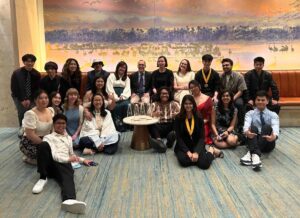 On Thursday, March 12, Skyline College welcomed internationally renowned researcher, educator and author of Post Traumatic Slave Syndrome, Dr. Joy DeGruy. With over twenty years of practical experience as a professional in the field of social work, she is known for giving practical insight into various cultural and ethnic groups that form the basis of contemporary American society.
On Thursday, March 12, Skyline College welcomed internationally renowned researcher, educator and author of Post Traumatic Slave Syndrome, Dr. Joy DeGruy. With over twenty years of practical experience as a professional in the field of social work, she is known for giving practical insight into various cultural and ethnic groups that form the basis of contemporary American society.
During her address to a packed crowd of Skyline College students and staff, DeGruy discussed the topic of the legacy of slavery, the taboo around the word, and the deeply rooted effects of slavery and its surrounding institutions that still deeply impact the African American community to this day. She argued that slavery led to deep-seeded, and ongoing, multi-generational trauma, but that the discussion of slavery and this trauma is something that is shied away from and in many cases discouraged. She underscored, throughout her lecture, the idea of cognitive dissonance, or the anxiety that results from simultaneously holding contradictory or otherwise incompatible attitudes and beliefs.
Drawing on an examination of the institution of chattel slavery, and pulling from words from a variety of scholars, DeGruy painted a picture of over 300 years of American slavery and illustrated the ways the resulting trauma has continued to affect African Americans and has directly contributed to a cycle of post-traumatic stress syndrome, dubbed slave syndrome by DeGruy, that has very real consequences that spread inexorably from one generation to the next.
DeGruy concluded her remarks by stressing that to begin to solve this problem, and to begin to heal, all of us need to break the taboo on the discussion of slavery and speak about it, learn about it, and more deeply explore the truth. She summarized with a call to action for the crowd: “Tell your stories. Our children don’t know who they are because we stopped telling our stories. It doesn’t matter if it’s a good story, or a bad story, or if we lost everything, because what we have in the end is each other.”
With this message in mind, the students and staff who attended the event will find it hard not to go forth and speak more knowledgeably about their own stories, and to try, at the very least, to better understand those stories within the undeniable and ongoing legacy of slavery.
Article by Connor Fitzpatrick | Photo by Maryam Hadi






